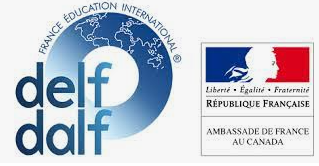Bonjour
Students
Welcome to my blog where I will be sharing information about
the DELF Junior exam, a proficiency test for young learners of French as a
foreign language. The exam is designed to assess the language skills of
students aged between 12 to 18 years and is recognized by the French Ministry
of Education. In this blog, you will find details about the exam structure,
levels, and benefits of taking the DELF Junior exam.
What is delf junior exam?
DELF Junior is a French language proficiency test designed
for young learners between the ages of 11 and 18 who are non-native speakers of
French. It assesses their ability to communicate effectively in French in
various contexts, such as everyday situations, school, and leisure activities.
The DELF Junior test is divided into four levels: A1, A2,
B1, and B2. Each level evaluates the student's skills in four areas: listening,
speaking, reading, and writing.
The DELF Junior certificate is widely recognized by educational institutions and employers in French-speaking countries as proof of a student's French language proficiency.
Benefits of DELF Junior exam.
DELF Junior is an internationally recognized exam that
assesses the French language skills of young students between the ages of 12
and 18. There are several benefits of taking the DELF Junior exam, including:
v
Recognized worldwide: DELF Junior is recognized
by many educational institutions and organizations worldwide as proof of a
student's French language proficiency.
v
Enhances academic profile: Passing the DELF
Junior exam can enhance a student's academic profile and increase their chances
of getting accepted into universities and educational programs.
v
Improves language skills: Preparing for the DELF
Junior exam can help students improve their French language skills, including
reading, writing, listening, and speaking.
v
Encourages cultural understanding: DELF Junior
exams encourage students to learn more about French culture and customs, which
can help foster cultural understanding and appreciation.
v
Builds confidence: Successfully passing the DELF
Junior exam can give students a sense of accomplishment and build their
confidence in their language abilities.
Overall, the DELF Junior exam can provide students with a valuable credential and help them develop their French language skills, which can benefit them in their academic and personal lives.
Marking /Duration of Delf Junior Exam
v
Duration: The exam duration varies depending on
the level. For A1, A2, and B1, the exam lasts for 1 hour and 20 minutes. For
B2, the exam lasts for 1 hour and 50 minutes.
v
Types of exam: The DELF Junior exam assesses the
four language skills: listening, reading, writing, and speaking. The exam
consists of several sections, including multiple-choice questions, short-answer
questions, and essay writing. The speaking test is conducted face-to-face with
an examiner.
v
Marking: The exam is scored on a scale of 0 to
100, with a minimum score of 50 required to pass. Each section of the exam is
worth a certain number of points, and the scores are added together to obtain
the final result.
v Difficulty: The difficulty of the exam varies depending on the level. Generally, the A1 and A2 levels are considered easier, while the B1 and B2 levels are more challenging. However, the difficulty also depends on the individual's level of proficiency in French. It is recommended to prepare thoroughly for the exam in order to achieve the best possible score.
Where we can give DELF Junior exam ?
DELF Junior exams can be taken at authorized examination centers of the French Ministry of Education and the French Embassy or Consulate in your country. You can check the official website of the French Ministry of Education or the French Embassy or Consulate in your country to find the nearest authorized examination center for the DELF Junior exam.
Can I give DELF Junior exam online ?
No, DELF Junior exams cannot be taken online as they require candidates to complete different types of language assessments, including listening, speaking, reading, and writing, which cannot be fully evaluated through an online platform. The exam must be taken in person at an accredited testing center or school. However, some institutions may offer online preparation courses and resources to help candidates prepare for the exam.
Here are some websites where you can
find more information about the DELF Junior exam in various countries:
Asia: Alliance Française centers in different countries:
https://www.alliancefrancaise.org.sg/, https://afmanila.org/,
https://www.afdhaka.org/
French embassy or consulate websites in different countries:
https://cn.ambafrance.org/, https://www.ambafrance-id.org/, https://www.ambafrance-au.org/
United States:
https://frenchlanguage.frenchculture.org/testing/delf-dalf-exams,
https://www.fiaf.org/courses/delf-dalf-exams.shtml
United Kingdom:
https://www.institut-francais.org.uk/learn-french/exams/delf-dalf/
Canada: https://www.alliancefrancaise.ca/delf-dalf-exams/
Australia: https://www.afsydney.com.au/exams/delf-dalf/
These websites provide information about test centers, exam fees, registration procedures, exam dates, and sample papers for the DELF Junior exam.
In conclusion, DELF Junior Exam is a great opportunity for young language learners to showcase their French language skills and earn an internationally recognized certification. The benefits of this exam include improved employment and educational opportunities, as well as enhanced language proficiency. The exam consists of four parts, and its duration varies based on the level of the exam. While it cannot be taken online, there are various institutions across different countries where students can register and appear for the exam. So, if you are a young French language learner, taking the DELF Junior Exam can be a valuable and rewarding experience for you.
Bonne Chance !
#frenchwithanil

.png)

.png)
No comments:
Post a Comment